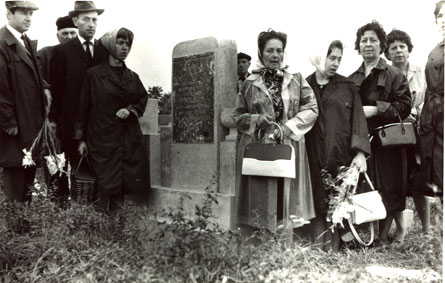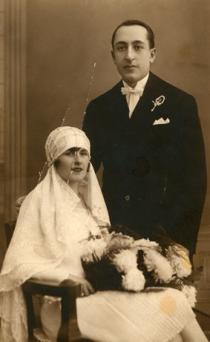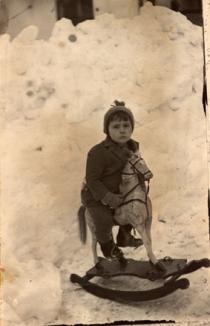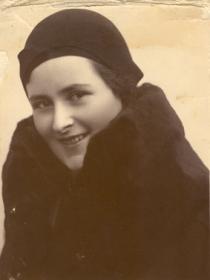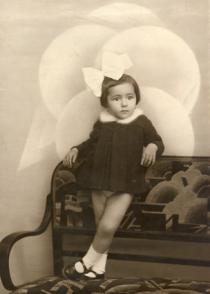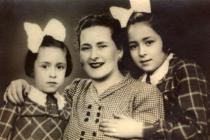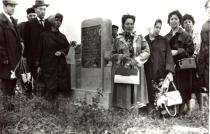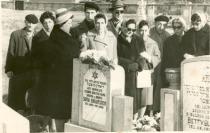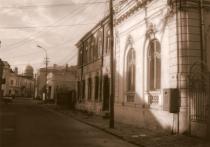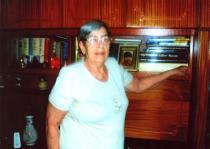This is a photograph taken at my father's grave, Basch Moise, in the Jewish cemetery in Braila.
My mother is standing next to the tombstone, on the right, while my sister-in-law Mioara is to the left of it and my brother Silviu is standing next to her.
I am somewhere on the right, to a side, I'm partially visible, and three of my mother's friends can be seen between my mother and me. I think that the man standing next to my brother is the one who performed the blessing ceremony.
The photograph was taken in 1965. My mother now lies next to my father's grave, where there was a free plot at that time, this is where we buried her. My father's tombstone reads:
"Here lies our beloved husband, father and father-in-law." It states that my father was born on 6th September 1898. And he died on 28th February 1964.
My maiden name is Eveline Basch, I was born in December 1932, and my married name is Ciocoiu. I had a brother, Silviu, who was older than me, he being the firstborn, in 1929.
I also have a sister, Grete, who was born in December 1936 and has been living in Israel since 1970.
My mother was a sworn atheist. My father was a very religious Orthodox Jew.
When his parents came to meet my mother and found out she wasn't a zealot, they didn't really want my father to marry her, but then they thought that she was young and that any offshoot can be converted.
But the exact opposite happened, for it was my father who swayed. When he came to Braila, my father was a religious person, and my mother changed him completely.
My father attended religious schools in Austria-Hungary, for Jews had such schools back then, just as they do nowadays in Israel.
Here, in Braila, the custom was to attend the synagogue on holidays; the men remained on the ground floor and the women went upstairs, and my father would accompany my grandmother to the synagogue because I believe my mother never set foot inside the synagogue after the wedding.
Concerning the languages my parents spoke, my father used to say that he doesn't speak Romanian and that he forgot Hungarian.
He spoke Romanian very poorly, but he could speak and write Hebrew. My parents didn't speak Yiddish at home.
I can safely say that my parents were well-to-do. My mother certainly had hired helpers around the house. There were times when she even had two women who helped her with household chores.
As a rule, there were many women in our house: there was my mother, the grandmother from my mother's side, and one of my mother's sisters, Tilly, who lived with us until the end of the war when she got married.
Until 1948-1950 my parents' financial situation was very good, meaning that one person was working, namely my father, and he was able to support seven others.
Afterwards, my father had to give up the store, but I forgot the actual year when that happened. I was still a student then. My father started working in a state-run butcher's shop.
That is why I say that the financial situation worsened afterwards, because my sister started working after she graduated from high school.
My father died in February 1964. My mother died in February 1973. Silviu died in February 1989 as well. I mean to say that they all died in the month of February: both my mother, and my father, and my brother. That's how it came to pass.
My parents are buried in Braila, in the Jewish cemetery. I believe that there was still a rabbi in Braila when my father died. The grief was so great in those days that I'm not really sure of this.
The religious ceremony was as it is nowadays, meaning that our rituals are much shorter and less pompous, which is to say that the priest [the rabbi] puts on less of an act.
Actors and priests are alike in nature, in my opinion. I even had a photograph once taken on the occasion of the blessing of my father's tombstone. We observe the Yahrzeit, meaning the 'Commemoration of the dead.'
